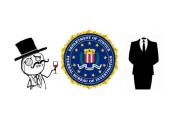FBI directed Anonymous cyberattacks against foreign government websites
Posted by: Jon Ben-Mayor on 04/25/2014 10:09 AM
[
 Comments
]
Comments
]
According to court documents, Hector Xavier Monsegur, AKA Sabu, the FBI informant who ratted out various members of Anonymous including Jeremy Hammond, was responsible for directing hundreds of hacks against foreign government websites. The information came to light during Hammond's court case which indicates that "Sabu" operated at the direction the FBI before outing Hammond.
 An F.B.I. spokeswoman declined to comment, as did lawyers for Mr. Monsegur and Mr. Hammond.
An F.B.I. spokeswoman declined to comment, as did lawyers for Mr. Monsegur and Mr. Hammond.
The hacking campaign appears to offer further evidence that the American government has exploited major flaws in Internet security — so-called zero-day vulnerabilities like the recent Heartbleed bug — for intelligence purposes. Recently, the Obama administration decided it would be more forthcoming in revealing the flaws to industry, rather than stockpiling them until the day they are useful for surveillance or cyberattacks. But it carved a broad exception for national security and law enforcement operations.
Hours after the Times article was published on Wednesday, a wild leak appeared that is alleged to contain several paragraphs from Hammond that he authored last year for an article but were edited ahead of publication. The style of the writing in the document uploaded to the Pastebin website is on par with that of Hammond’s, and a source close to the case who asked to remain anonymous confirmed the authenticity of the excerpt to RT early Thursday.
"In view of NYT's reporting, we would like to add some additional context to this statement," the excerpts are prefaced.
“Sabu is not the real issue,” Hammond reportedly wrote. “What is important is how the FBI used him, and how they may still be using other hacktivists to gather intelligence and illegally break into websites without oversight, accountability or reprisal.”
“In my case, the FBI used Sabu to infiltrate and monitor hundreds of public and private hacker chatrooms where he was able to gain influence within Anonymous by claiming responsibility for hacks carried out by others, bragging to the media with hyperbolic quotes, accusing others of being sellouts and snitches and encouraging hacks into government and corporate websites,” it continued. “He enabled hackers and facilitated hacks by supplying several servers for storage of hacked emails and databases, cracking encrypted password lists, suggesting specific targets and offering step-by-step technical advice to people as they were breaking into systems. Impressionable and less experiences hackers, eager to please a visible Anonymous ‘leader’ would send him their half-finished vulnerability findings; Sabu would then pass this information along to skilled hackers to finish the job.”
Practically at the same time that Hammond’s alleged statement surfaced on Thursday, the online digital library Cryptome.org published a 94-page collection of court documents that seem to further show the extent of the FBI’s role in coercing Anonymous with the help of their undercover informant. [Notice: Upon initial publishing of this article, RT became aware that these documents were made available by the court on the PACER website on April 16. However, they were not reported on until now].
 An F.B.I. spokeswoman declined to comment, as did lawyers for Mr. Monsegur and Mr. Hammond.
An F.B.I. spokeswoman declined to comment, as did lawyers for Mr. Monsegur and Mr. Hammond.The hacking campaign appears to offer further evidence that the American government has exploited major flaws in Internet security — so-called zero-day vulnerabilities like the recent Heartbleed bug — for intelligence purposes. Recently, the Obama administration decided it would be more forthcoming in revealing the flaws to industry, rather than stockpiling them until the day they are useful for surveillance or cyberattacks. But it carved a broad exception for national security and law enforcement operations.
Hours after the Times article was published on Wednesday, a wild leak appeared that is alleged to contain several paragraphs from Hammond that he authored last year for an article but were edited ahead of publication. The style of the writing in the document uploaded to the Pastebin website is on par with that of Hammond’s, and a source close to the case who asked to remain anonymous confirmed the authenticity of the excerpt to RT early Thursday.
"In view of NYT's reporting, we would like to add some additional context to this statement," the excerpts are prefaced.
“Sabu is not the real issue,” Hammond reportedly wrote. “What is important is how the FBI used him, and how they may still be using other hacktivists to gather intelligence and illegally break into websites without oversight, accountability or reprisal.”
“In my case, the FBI used Sabu to infiltrate and monitor hundreds of public and private hacker chatrooms where he was able to gain influence within Anonymous by claiming responsibility for hacks carried out by others, bragging to the media with hyperbolic quotes, accusing others of being sellouts and snitches and encouraging hacks into government and corporate websites,” it continued. “He enabled hackers and facilitated hacks by supplying several servers for storage of hacked emails and databases, cracking encrypted password lists, suggesting specific targets and offering step-by-step technical advice to people as they were breaking into systems. Impressionable and less experiences hackers, eager to please a visible Anonymous ‘leader’ would send him their half-finished vulnerability findings; Sabu would then pass this information along to skilled hackers to finish the job.”
Practically at the same time that Hammond’s alleged statement surfaced on Thursday, the online digital library Cryptome.org published a 94-page collection of court documents that seem to further show the extent of the FBI’s role in coercing Anonymous with the help of their undercover informant. [Notice: Upon initial publishing of this article, RT became aware that these documents were made available by the court on the PACER website on April 16. However, they were not reported on until now].
Comments






